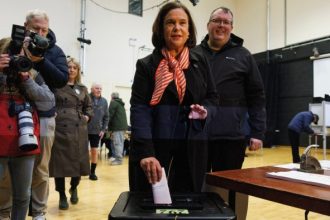From the late 1980s to the second decade of the 21st century, few politicians in the democratic world shaped the course of European history more profoundly than Wolfgang Schäuble, the German statesman who has died at the age of 81.
His political acumen, financial expertise and grasp of international affairs made him an indispensable assistant to Helmut Kohl and Angela Merkel, the chancellors whom he loyally served as Europe underwent its deepest transformations since the second world war.
A bold thinker, master of detail and sharp-tongued controversialist, Schäuble earned criticism as well as plaudits as he charted the German response to the collapse of eastern European communism in 1989, designed road maps for closer EU integration in the 1990s and crafted emergency measures to save Europe’s monetary union after 2010.

As Germany’s finance minister during the debt and banking crises that threatened the eurozone’s survival, Schäuble insisted on rigorous fiscal discipline as a core condition of the multibillion-euro bailouts arranged for Greece and other stricken countries.
However, far from seeing himself as some high priest of austerity, Schäuble contended that his fundamental principle was the sustainability of the public finances over the long term. As he wrote in a Financial Times column in 2021, this meant that some large-scale stimulus programmes were justified, including the EU’s post-pandemic recovery fund, as long as governments accepted they must eventually repay the debt.
Throughout his career, Schäuble displayed an iron will to recover from private and political blows that might have felled a lesser politician.
Having been shot by a mentally disturbed man at an election rally in 1990, Schäuble was paralysed from the waist down and used a wheelchair for the three decades when his influence on German politics was at its highest. “I cannot change what happened, but as long as I live, I’ll live,” he said.

A dominant figure in Germany’s centre-right Christian Democratic party (CDU), Schäuble succeeded Kohl as CDU leader after the party lost the 1998 Bundestag elections and a Social Democrat-Green coalition took office. It seemed a near certainty that Schäuble would one day become chancellor, a role for which he seemed supremely qualified.
However, he was compelled to resign as party leader in 2000 after the eruption of a scandal involving illegal financial donations to the CDU. Schäuble, though not at the heart of the affair, admitted having received DM100,000 in 1994 from an arms dealer and lobbyist named Karlheinz Schreiber.
The scandal did not destroy Schäuble’s career but prompted a generational change in the CDU’s upper ranks that put Merkel in control of the party until her retirement in 2021. After Merkel became chancellor in 2005, Schäuble served as her interior minister for four years before taking over as finance minister.
He stayed in that post until 2017, in effect the number two in her government. He then became president of the Bundestag, a position similar to that of speaker of the house in other parliamentary democracies.
At the time of his death, he was the longest-serving member of the legislature, having been first elected to the Bundestag in the former West Germany in 1972.
Born on September 18 1942 near Freiburg in the south-western state of Baden-Württemberg, Schäuble, the son of a local CDU politician, studied economics and law. After writing his thesis on the professional legal status of auditors, he entered the Bundestag and rapidly became a close associate of Kohl, the CDU’s rising star of the 1970s. Schäuble married Ingeborg Hensle and had four children.

During Kohl’s 1982-1998 chancellorship, Schäuble developed a particular expertise on political and economic conditions in communist East Germany, making him the obvious candidate to lead the West German team during negotiations on German reunification after the fall of the Berlin Wall in 1989.
Reunification brought enormous social and economic disruption in the east, but 30 years later Schäuble asserted in a newspaper article that eastern Germans should be proud of their progress. “Some maintain their own victim status, instead of confidently pointing out their valuable experience in adapting to massive social upheaval, compared to the west,” he wrote.
In 1994, he and Karl Lamers, a fellow CDU politician, caused a storm by recommending that European political and economic integration should proceed with a “hard core” of countries at its heart — namely, Germany, France and the Benelux trio. The proposal went nowhere because it deeply offended Italy and Spain and won no support in Paris.
Still, Schäuble returned to these ideas some 20 years later, proposing that the eurozone should be more centralised, with its own legislative assembly and a commissioner empowered to reject national budgets that broke common fiscal rules.

During the eurozone debt crisis, Schäuble departed from the German government’s official line by suggesting that Greece should take a “timeout for a few years” from membership of the club. Merkel and other European leaders rejected the idea, fearing that it would put into question the irreversibility of the currency union.
Finance ministers and bankers in other EU countries remembered Schäuble for his plain language. After introducing a ban in 2010 on certain types of financial market speculation, he observed: “If you want to drain a swamp, you don’t necessarily ask the frogs if you want an objective verdict.”
“He has a wicked sense of humour, very acidic,” said George Papaconstantinou, Greece’s finance minister at the start of the debt crisis. He recalled Schäuble asking him, in an apparent allusion to Greece’s gaping budget deficit: “Are you a real finance minister?”

To Christine Lagarde, his French counterpart, who later became the IMF’s managing director and European Central Bank president, Schäuble once said: “You have more experience, you worked for a big US law firm, you had a big career, and you played a huge role in France, but I understand politics much better than you do.”
Schäuble himself acknowledged that at times he “got on my colleagues’ nerves”.
In a tribute, German chancellor Olaf Scholz said: “Germany has lost a sharp thinker, passionate politician and pugnacious democrat.”
Read the full article here




